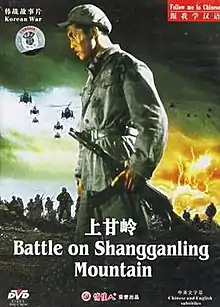Battle on Shangganling Mountain (film)
Shangganling (Chinese: 《上甘岭》; pinyin: Shànggānlǐng) is a 1956 Chinese war film, also translated as Battle of Shangganling and Battle on Shangganling Mountain. It depicts the Battle of Triangle Hill (Shangganling in Chinese) during the Korean War, an especially bloody battle that resulted in eventual Chinese victory.[1]
| Shangganling | |
|---|---|
 DVD front cover | |
| Traditional Chinese | 上甘嶺 |
| Simplified Chinese | 上甘岭 |
| Hanyu Pinyin | Shànggānlǐng |
| Directed by | Lin Shan Sha Meng |
| Starring | Gao Baocheng Xu Linge Liu Yuru |
Release date |
|
| Country | China |
| Language | Mandarin |
The film follows a group of Chinese People's Volunteer Army soldiers who are holding Triangle Hill for several days against the U.S. Army and the Republic of Korea Army. Short of both food and water, they hold their ground until the relief troops arrive. The movie shows Chinese victory over the American invasion, and the People's Volunteer Army soldiers were shown as Chinese war heroes.[2] The film's style and view of the battle have been contrasted with the 1959 American film Pork Chop Hill.[3]
The spirit of Shangganling
The Battle of Shangganling has become a symbol of Chinese "die for the sake of motherland" heroism, and also the symbol of fighting spirit of the Chinese military. Taking into account of the absolute superiority of American ground artillery power and air power, resulting in the People's Volunteer Army regaining their original positions against high American and South Korean casualties, the Chinese promote it as a military victory with emphasis on Chinese soldier's endurance and sacrifice.[4][5]
White House performance controversy
On 19 January 2011, pianist Lang Lang played the theme song of this movie at a White House state dinner for Chinese President Hu Jintao. The event generated controversies within both US and China,[6] similar to the "anti-Soviet" music of composer Dmitri Shostakovich.
See also
- "My Motherland", a popular song featured in the film
References
- Borkowski, Walt (2001-09-13). "Oral History Interview - Thomas Martin". Trenton, NJ: Department of Military & Veterans Affairs, State of New Jersey. Archived from the original on 3 March 2009. Retrieved 2009-02-05.
- http://tv.people.com.cn/GB/79889/9443841.html Archived 2010-12-10 at the Wayback Machine 线观看:老电影《上甘岭》(1956年)
- Paul G. Pickowicz, "Revisiting Cold War Propaganda: Close Readings of Chinese and American Film Representations of the Korean War," Journal of American-East Asian Relations 17 (2010): 352-371.
- http://news.sohu.com/20060505/n243116799.shtml 上甘岭精神 |来源:解放军报
- http://blog.gmw.cn/u/60532/archives/2010/271476.html%5B%5D “上甘岭”成为中国军人敢打必胜的代名词 人民网2010年08月17日08:44 来源:《中国青年报》
- Richter, Paul. Chinese-born pianist denies he played song to insult U.S. Los Angeles Times 25 January 2011; http://www.latimes.com/news/nationworld/nation/la-na-white-house-pianist-20110125,0,52927.story